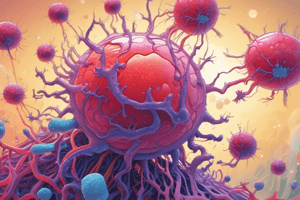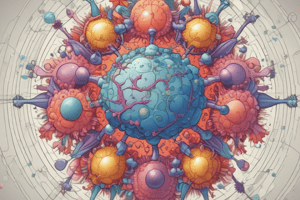Podcast
Questions and Answers
What is the primary role of antigens in acquired immunity?
What is the primary role of antigens in acquired immunity?
- To produce antibodies in the body
- To stimulate the formation of T lymphocytes (correct)
- To facilitate the production of B lymphocytes
- To directly destroy invading cells
Which statement best describes the formation of T lymphocytes?
Which statement best describes the formation of T lymphocytes?
- They can be activated without the presence of antigens.
- They arise directly from stem cells in the bone marrow.
- They are produced in the lymph nodes.
- They develop extreme diversity in the thymus gland. (correct)
What percentage of T lymphocytes are typically destroyed in the thymus gland during selection?
What percentage of T lymphocytes are typically destroyed in the thymus gland during selection?
- 90 percent (correct)
- 75 percent
- 30 percent
- 50 percent
How does the thymus gland ensure that T lymphocytes do not react against self-tissues?
How does the thymus gland ensure that T lymphocytes do not react against self-tissues?
What happens to T lymphocytes that react to self-antigens in the thymus?
What happens to T lymphocytes that react to self-antigens in the thymus?
Where do T lymphocytes go after they are processed in the thymus gland?
Where do T lymphocytes go after they are processed in the thymus gland?
What distinguishes activated T lymphocytes from antibodies?
What distinguishes activated T lymphocytes from antibodies?
What initiates the development of acquired immunity?
What initiates the development of acquired immunity?
How do stem cells contribute to T lymphocyte formation initially?
How do stem cells contribute to T lymphocyte formation initially?
Which of the following best describes the function of T lymphocytes during an immune response?
Which of the following best describes the function of T lymphocytes during an immune response?
Study Notes
Immune System
- Cytotoxic T cells destroy cells infected by viruses, cancer cells, or transplanted organ cells, and are crucial for maintaining osmotic equilibrium in cells.
- Suppressor T cells regulate the activities of other immune cells, preventing excessive immune reactions that could harm the body.
Tolerance Mechanism
- The immune system recognizes self-tissue as distinct from invading organisms, and this recognition develops during T lymphocyte processing in the thymus and B lymphocyte processing in the bone marrow.
- Self-reacting T and B lymphocytes are destroyed due to continuous exposure to self-antigen in the fetus, preventing autoimmune diseases.
Autoimmune Diseases
- Failure of the tolerance mechanism leads to autoimmune diseases, such as rheumatic fever, where the immune system attacks the body's own tissues.
Immunization
- Active immunity can be achieved through injection of dead organisms, toxins treated with chemicals, or live organisms that have been attenuated.
- Passive immunity involves infusing antibodies, activated T cells, or both from an immunized individual or animal, providing temporary protection against disease.
Allergy and Hypersensitivity
- Allergy is an undesirable side effect of immunity, caused by activated T cells or IgE antibodies, leading to skin eruptions, edema, or asthmatic attacks.
- IgE antibodies bind to mast cells and basophils, releasing substances that induce vasodilation, increased capillary permeability, and attraction of neutrophils and eosinophils.
- Examples of allergic reactions include hive (urticaria) and hay fever (allergic rhinitis).
Cell-Mediated Immunity
- Cell-mediated immunity involves the formation of activated T lymphocytes that destroy foreign agents.
- The thymus gland preprocesses T lymphocytes, allowing them to develop diversity in reacting against different antigens.
Thymus Gland
- The thymus gland preprocesses T lymphocytes, allowing them to develop extreme diversity in reacting against different antigens.
- The thymus ensures that T lymphocytes leaving the thymus will not react against the body's own tissues by selecting and releasing only non-self-reacting T lymphocytes.
Studying That Suits You
Use AI to generate personalized quizzes and flashcards to suit your learning preferences.
Related Documents
Description
This quiz covers the roles of cytotoxic and suppressor T cells in the immune system, including their functions in destroying infected cells and regulating immune reactions.




